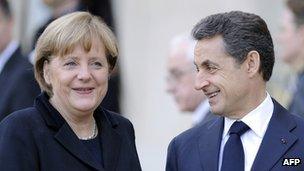Has Merkozy taken Italy out of the danger zone?
- Published
- comments

The cost for Italy and Spain of borrowing fell sharply today.
The implied interest rate on 10-year loans to the Italian government fell more than half a percentage point - a remarkable drop - to less than 6%. Which is well below the 7% danger zone for the first time in six weeks.
That implies investors see the risk of a full-scale eurozone meltdown as having receded significantly. Which is obviously good news for the UK, since - as our prime minister and Bank of England governor are wont to say - the biggest economic threat to the UK right now would be a disorderly break up of the European currency union.
So what is it that has cheered up investors?
First, they like Italy's emergency 30bn euro package of tax increases, spending cuts and pension reforms - which raises hopes that the government of technocrats under Mario Monti may start to whittle away the Italian public sector's massive debt burden.
Second, the agreement between President Sarkozy of France and Chancellor Merkel of Germany to demand tougher sanctions on eurozone governments that borrow more than 3% of GDP may at last persuade the European Central Bank that it's safe for it make heavier purchases of - for example - Italian government bonds, as and when Italy is being shunned by investors.
More than anything else, investors want to see the ECB behaving as the bond-buyer of last resort.
Finally, and perhaps most important of all, Germany has dropped its demand that in any future bailouts of governments with excessive debts, there should be losses imposed on private-sector creditors - which more than anything else explains why holders of Italian bonds are feeling a little less anxious this evening.
All that said, investors may be indulging in a bit of punting on unhatched chickens.
There are plenty of uncertainties surrounding today's Franco-German deal.
Will other eurozone members sign up for it?
Will the European Central Bank really see it as legitimising significant purchases by it of eurozone governments' debt?
And will the proposed integration of eurozone countries' tax, spending and borrowing policies be both effective and acceptable to citizens who still want national governments to count for something?
Or to put it another way, we should all probably keep our fingers crossed that investors' optimism is well-founded, without betting our livelihoods on it.
Update 19:39: The FT reports that the ratings agency Standard and Poor's is set to put six AAA-rated eurozone governments on "creditwatch negative".
Given that the FT quotes extensively from an alleged S&P report, the assumption is that what the FT says is spot on - though, bizarrely, S&P is refusing to confirm or deny the story.
As yet, regulators have not forced S&P to make a statement, even though arguably there is now a false market in the euro and in eurozone debt.
Anyway let's assume S&P is about to do what the FT says it is about to do. That would mean there is a 50:50 chance that these governments will lose their cherished AAA status.
What has set the cat among the pigeons in markets is that one of these governments is that of the strongest and biggest economy in Europe, Germany.
The others are France, the Netherlands, Austria, Finland and Luxembourg.
Why does any of this matter?
Well, whether these governments like it or not (and they don't), the ratings agencies still have an influence on how much they have to pay to borrow - in spite of the horlicks the agencies made of rating all those investments made out of sub-prime loans prior to the 2007/8 crash.
To be clear, the issue is not that the interest rate paid by Germany is likely to rise much, if at all. The German government will still be seen as the only proper safe haven within the eurozone.
But if some or all of the six lose AAA, it will be almost impossible for the eurozone's bailout fund, the European Financial Stability Facility, to keep its AAA.
That will make it harder and pricier for the EFSF to borrow. Which in turn means that it may be forced to charge more to governments it rescues.
And, perhaps most significantly, increasing the firepower of the EFSF, so that it could lend to a big borrower like Italy in the event that an Italy was shut out of markets, well that would be pretty close to impossible.
All of which means that the renewed optimism of investors after today's entente between President Sarkozy and Chancellor Merkel could be wiped out.
S&P certainly knows how to win friends and influence people.